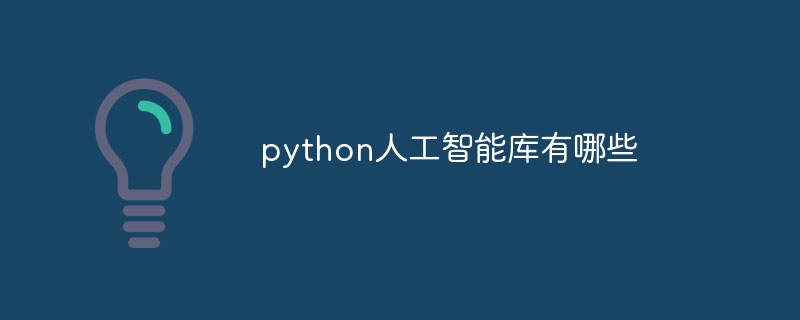Home >Backend Development >Python Tutorial >What are the python artificial intelligence libraries?
Python artificial intelligence libraries include: 1. TensorFlow; 2. PyTorch; 3. Keras; 4. Scikit-learn; 5. NLTK; 6. spaCy; 7. Gensim; 8. Deeplearning4j; 9. PyTorch Geometric ; 10. DGL. Detailed introduction: 1. TensorFlow, which is an open source deep learning framework developed by Google, which provides a wealth of APIs and tools, etc.

Python is one of the most commonly used programming languages in the field of artificial intelligence, so there are many Python libraries specifically designed for artificial intelligence tasks. The following are some major Python artificial intelligence libraries:
1. TensorFlow: This is an open source deep learning framework developed by Google. It provides a rich API and tools that allow users to Easily build and train neural network models. TensorFlow supports a variety of hardware platforms and can be easily expanded to large-scale distributed computing environments.
2. PyTorch: This is another deep learning framework developed by Facebook. Compared with TensorFlow, it is more flexible and easier to use. PyTorch supports dynamic calculation graphs, making it easier for users to develop and debug models.
3. Keras: This is a high-level neural network API based on TensorFlow. It provides a simple API and easy-to-use tools, allowing users to easily build and train deep learning models. .
4. Scikit-learn: This is a Python library specially designed for machine learning tasks. It provides a large number of algorithms and tools, including classification, regression, clustering, and dimensionality reduction. wait. Scikit-learn's API is very simple and easy to use, allowing users to quickly conduct machine learning experiments.
5. NLTK: This is a Python library specially designed for natural language processing tasks. It provides a large number of tools and algorithms, including word segmentation, part-of-speech tagging, named entity recognition, emotion Analysis etc.
6. spaCy: This is a natural language processing library based on Python. It provides efficient algorithms and tools, allowing users to easily perform part-of-speech tagging, named entity recognition, dependency Syntactic analysis and other tasks.
7. Gensim: This is a Python library specially designed for natural language processing and text mining tasks. It provides efficient algorithms and tools, including topic modeling and document similarity. Computing, sentiment analysis, etc.
8. Deeplearning4j: This is a deep learning library based on Java and Scala, but it also provides a Python interface. Deeplearning4j supports a variety of hardware platforms and can be easily expanded to large-scale distributed computing environments.
9. PyTorch Geometric: This is a geometric deep learning library based on PyTorch. It provides APIs and tools specially designed for graph neural networks, allowing users to easily conduct graph neural networks. Network development and training.
10. DGL: This is a graph neural network library based on Python. It provides a rich API and tools, including the construction, training, inference, etc. of graph neural networks. DGL supports a variety of hardware platforms and can be easily expanded to large-scale distributed computing environments.
The above are some of the main Python artificial intelligence libraries, but there are actually many other libraries and tools to choose from and use. Different libraries and tools have their unique application scenarios and advantages. Users can choose the appropriate libraries and tools according to their own needs.
The above is the detailed content of What are the python artificial intelligence libraries?. For more information, please follow other related articles on the PHP Chinese website!